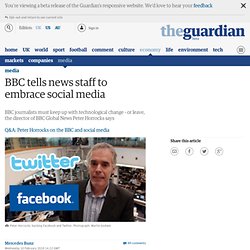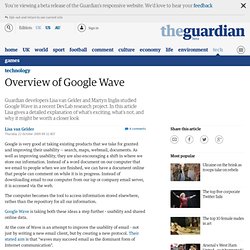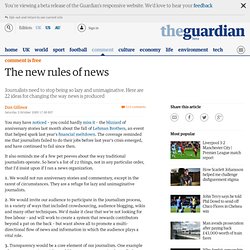

BBC tells news staff to embrace social media. BBC news journalists have been told to use social media as a primary source of information by Peter Horrocks, the new director of BBC Global News who took over last week.

He said it was important for editorial staff to make better use of social media and become more collaborative in producing stories. "This isn't just a kind of fad from someone who's an enthusiast of technology. I'm afraid you're not doing your job if you can't do those things. It's not discretionary", he is quoted as saying in the BBC in-house weekly Ariel. Horrocks said that technology was changing journalism, adding that it was important for the BBC to leave a programme-based mindset behind and adapt to new technologies. Internationally, news organisations already have professionalised their approach towards user content and social media. For BBC news editors, Twitter and RSS readers are to become essential tools, says Horrocks. Until now the broadcaster has been very cautious about social media. Overview of Google Wave. Google is very good at taking existing products that we take for granted and improving their usability -- search, maps, webmail, documents.

As well as improving usability, they are also encouraging a shift in where we store our information. Instead of a word document on our computer that we email to people when we are finished, we can have a document online that people can comment on while it is in progress. Instead of downloading email to our computer from our isp or company email server, it is accessed via the web. The computer becomes the tool to access information stored elsewhere, rather than the repository for all our information. Google Wave is taking both these ideas a step further - usability and shared online data.
At the core of Wave is an attempt to improve the usability of email - not just by writing a new email client, but by creating a new protocol. The biggest thing they want to change is concurrency so that email becomes a truly collaborative tool. Why should you care? The new rules of news. You may have noticed – you could hardly miss it – the blizzard of anniversary stories last month about the fall of Lehman Brothers, an event that helped spark last year's financial meltdown.

The coverage reminded me that journalists failed to do their jobs before last year's crisis emerged, and have continued to fail since then. It also reminds me of a few pet peeves about the way traditional journalists operate. So here's a list of 22 things, not in any particular order, that I'd insist upon if I ran a news organization. 1. We would not run anniversary stories and commentary, except in the rarest of circumstances. 2. 3. 4. 5. . - If we were a local newspaper, the editorial pages would publish the best of, and be a guide to, conversation the community was having with itself online and in other public forums, whether hosted by the news organization or someone else. - Editorials would appear in blog format, as would letters to the editor.